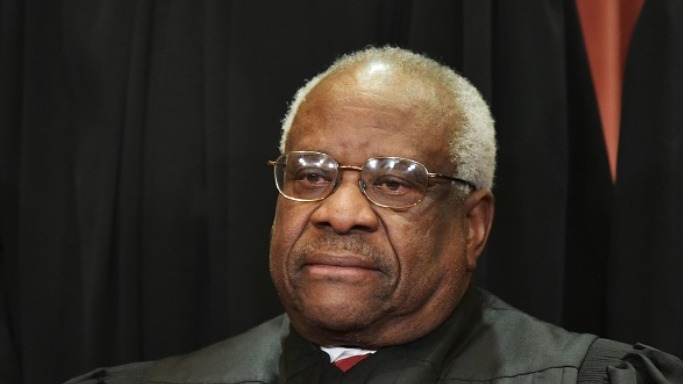Liberal Black elites like to slander their own people if they have an ‘R’ next to their name.
Rep. Cori Bush, D-Mo., derided Rep. Byron Donalds, R-Fla., as a “prop” during the recent U.S. House of Representatives speakership race.
California State University Los Angeles Professor Melina Abdullah called former California gubernatorial candidate Larry Elder “a Black face on white supremacy” last year.
Last week, Georgia State Sen. Emmanuel Jones called Supreme Court Justice Clarence Thomas “Uncle Tom” before a vote to place a statue of Thomas on the grounds of the state capitol.
These lawmakers and academics belong to a class of Black leaders who would rather disparage Black conservatives than understand them and work with them on common ground.
Jones is also painfully ignorant of history, as are so many who use the pejorative.
Uncle Tom, the fictional character from Harriet Beecher Stowe’s seminal book “Uncle Tom’s Cabin,” and the minister upon whose life this character was based, were liberators of slaves and defenders of Black women.
History aside, there are many issues afflicting the Black community, minority communities, and poor communities across America.
The left has a mediocre (at best) record of improving the safety, opportunity, and freedom of individuals.
Ad hominem attacks against minority conservatives do nothing to solve problems.
They do serve oppressive ends: punish those who abandon the group and deter others from leaving. Consider the opening lines of a Rolling Stone article: “WANTED: BLACK MEN needed to be buffoons — think Hershel Walker — in exchange for being treated like a King of the Moment and a figurehead greeted by Republican cheers?
“If interested, please call the GOP.”
Thankfully, younger generations of Blacks question blind allegiance to one-party dominance in the Black community and are looking for something new.
As the Rolling Stone writer admits, “the percentage of Black men voting blue has slipped in every national election since 2012.”
Black women are slowly following.
Groupthink, group vote, and group allegiance in the Black community are based upon a sense of shared identity and shared destiny.
In this context, being Black and conservative is considered treasonous.
Recent Pew Research provides insights on Black conservatives that paint a different picture. Over half of Black Republicans (and those that lean Republican) view their race as a significant aspect of their identity, compared with eight out of 10 Black Democrats.
Both groups are equally as likely to say their ancestry is central to their identity.
However, Black conservatives do not solely define themselves by their race and are more integrated with other races in ways that shape their viewpoints on life and politics, such as being less likely to attend a Black church.
They are also far less likely than their counterparts to ascribe to the belief in linked fates, such that what happens to Blacks in the U.S. will affect their own lives, or to view racist acts by individuals as the bigger problem compared to racism in the law.
Ironically, most Black adults (of either party affiliation) do not think that the favored policies among Black elites will actually affect their own lives.
In different Pew Research, post-2020, just 39% of Black adults believed that Black ownership in Black neighborhoods is most effective to advance racial equality, and even fewer (27%) think that Black elected officials solely governing Black neighborhoods is most effective for racial equality.
Enter the next generation.
Over a quarter (28%) of Black Republicans are ages 18 to 29 according to Pew. This is in contrast to the paltry 6% of Black Republicans among the 65-and-older crowd.
A generational shift is underway.
Here are two examples. Kim Klacik ran in Maryland’s 7th Congressional District twice unsuccessfully but flipped tens of thousands of votes.
Roxy Ndebumadu is the youngest woman elected to serve as a Bowie City Councilwoman in Maryland, and the first Black woman to represent District 4 within the state.
As we discussed during a recent panel “Unapologetically Conservative,” these women are disrupting the status quo by offering citizens — in solidly blue districts — another option.
They readily acknowledge that while no party has all of the right answers, we must be honest about how policies have failed kids and residents rather than doubling down on them and attacking critics.
Policy nuance and new approaches delivered with reasonableness are earning trust with voters. It’s understandable that the old guard is alarmed and turn to their tired bag of tricks including personal attacks against those who have broken free from the pack.
The next time you hear a Black conservative called a sellout, white supremacist, or Uncle Tom, consider the motive of the slanderer.
Perhaps those calling others names are the real oppressors.

